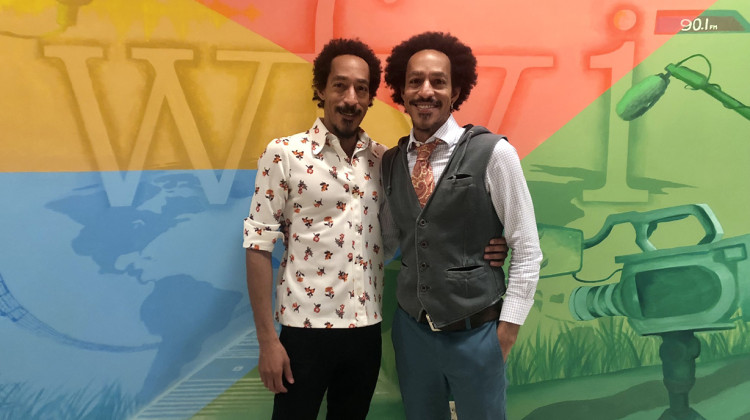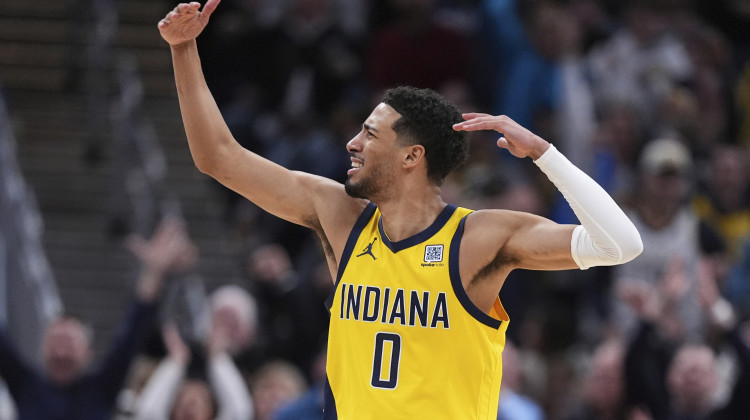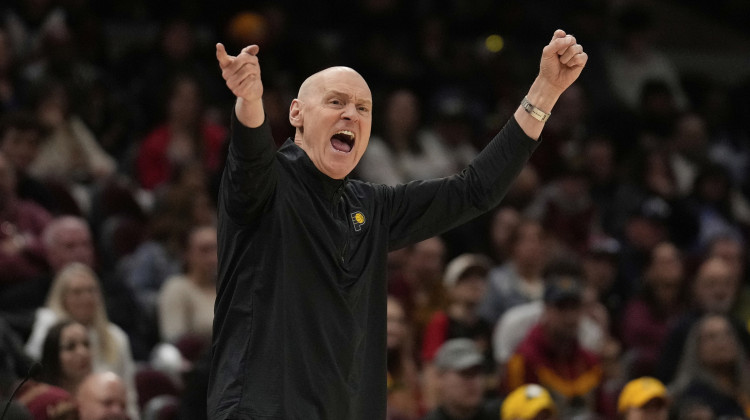
Indianapolis pianist Joshua Thompson (left) has built a career around advocating for classical composers and musicians of African descent. He's pictured here with his twin brother, jazz saxophonist Jared Thompson.
Kyle Long / WFYIIn recent years, American orchestras and classical music ensembles have faced criticism for their lack of diversity.
A 2023 study published by the League of American Orchestras found that Black musicians made up only 2.4 percent of orchestra musicians nationwide.
Indianapolis pianist Joshua Thompson has built a career around advocating for classical composers and musicians of African descent. His upcoming concert with the Indianapolis Chamber Orchestra highlights the work of Black composers and performers.
This transcript has been edited for length and clarity.
Kyle Long: As a child studying classical music at the piano, Joshua Thompson wondered why he wasn't performing works from composers who looked like him.
Joshua Thompson: You know, I've been playing since I was five. And at certain points in my life, whether it be 10 years old, 15 or 21, I loved all the music that I was playing, but I would sit back and be like, "Wait a minute, there's a lot of black people on the planet. How is it that I have not seen or heard or performed any of their works?"
Long: This April, Thompson will take the stage for the biggest concert of his career, a collaboration with the Indianapolis Chamber Orchestra, titled "Black Keys, The Evolution of the Black Classical Arts". In addition to performing, Thompson curated the program.
Thompson: So the program that I'm doing is amassing an entire program exclusively of composers of African descent. It is essentially my take of an origin story discussing the creation, development and evolution of the Black aesthetic.
I always like to tackle as many senses as possible, so you've got the world class ICO orchestra members, vocalist PsyWrn Simone, the Kenyetta Dance Co., which is an African dance company here in Indianapolis. I've wanted to work with them literally for about 10 years and I finally get to on this one, so I'm excited.
We also have Jared Thompson, saxophonist of Premium Blend on a couple features, and the program is narrated by the poet and writer Devon Ginn.
Long: Guest artist Jared Thompson is Joshua's twin brother. Jared has established a significant career as a jazz saxophonist in Indianapolis and he encouraged Joshua to pursue his musical vision.
Thompson: Joshua always played piano, always did, but never played out in public. And his biggest thing was, "I don't think anybody wants to listen to it. I don't think Black people want to listen to it." But I told him, I was like, "Nobody's doing that. here.
There's not a a Black classical pianist that's going out and performing things on their own and making their own opportunities to do it." I was like, "Dude, you have no competition here. Just do it."
Long: Joshua Thompson's collaboration with the Indianapolis Chamber Orchestra extends beyond the "Black Keys" concert. In 2022, Thompson was named creative partner-in-residence for the ICO as part of the League of American Orchestra's Catalyst Fund Incubator Grant, a program designed to promote inclusivity in classical music. ICO executive director Dana stone, said Thompson was an ideal partner for the orchestra.
Dana Stone: Over the past five years, the ICO really has been thinking a lot about the music that we perform, the artists that we engage, and and how we work within our community. Joshua being hired was a major kind of turning point for this process.
When we were awarded this grant, his name came to mind based on past collaborations with him, that he would just be a perfect asset for really helping us think creatively about ways to engage within our community to reflect musically, the goals of the organization. And here we are, you know, two years into this grant and things are really, really rolling and really exciting.
Long: Stone told me that the ICO's audience has been supportive of the orchestra's work to diversify its programming. But Thompson is aware this is all happening amidst a growing backlash against diversity, equity and inclusion programs.
Thompson: We're looking at now locally and nationally, the drum for DEI is not being beat nearly as much. We're even looking at legislation nationally, where DEI is being taken out of, you know, schools and whatnot. The reality is we're gonna call it something different and another few years, but the work behind it is still pretty much the same.
I mean, at the end of the day, I'm going to do this anyway, because what we're doing is making the story of classical music much more comprehensive, much more accurate, which makes it way more compelling and applicable to the realities of the world in which we live.
 DONATE
DONATE






 Support WFYI. We can't do it without you.
Support WFYI. We can't do it without you.